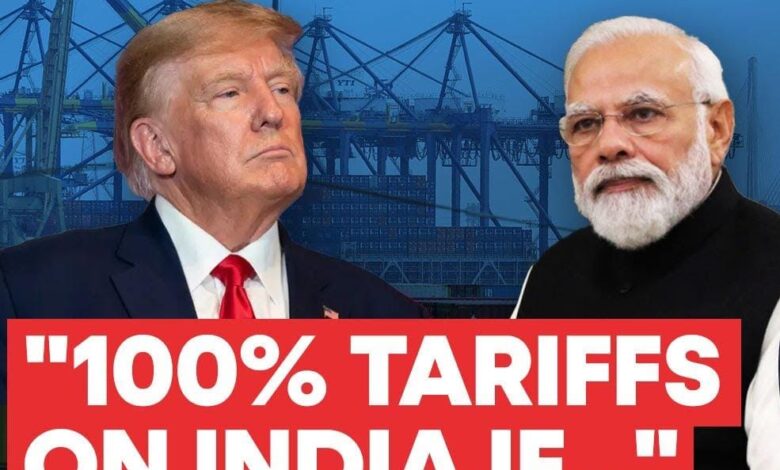
In a recent address to Parliament, Donald Trump made headlines by stating, “India imposes tariffs on us at over 100%, and in return, we will impose tariffs.” This provocative remark has ignited intense debate over trade policies and international economic relations, particularly between India and the United States. Trump’s statement is seen as a bold reflection of the growing tensions in global trade dynamics, highlighting the challenges that both nations face in balancing domestic interests with international cooperation.
Context of the Remarks
The controversial comments were delivered during a session in Parliament, where discussions on trade imbalances and tariff policies were at the forefront. Trump’s assertion came in response to ongoing debates about the high tariffs imposed by India on various imports, which he described as excessively punitive. The remark suggests a potential shift towards a more protectionist stance by the United States if similar measures are not reciprocated.
Trade Tensions:
Trump’s statement reflects the broader context of trade disputes that have been escalating between major economies. He claims that the tariffs imposed by India—reported to be over 100% on certain goods—are not only unfair but also detrimental to the global trade balance.
Reciprocal Measures:
By threatening to impose counter-tariffs, Trump’s remarks signal a possible escalation in trade conflicts. This kind of tit-for-tat tariff imposition is a strategy often employed to protect domestic industries but can lead to broader economic repercussions.
Impact on International Trade:
The remarks have significant implications for international trade relations. They underscore the importance of negotiating mutually beneficial trade agreements that can prevent retaliatory measures and ensure stable economic relations.
Implications for India-US Trade Relations
The statement by Trump is likely to have wide-ranging effects on the trade relationship between India and the United States. Here are some potential implications:
Increased Tensions:
If the threat of reciprocal tariffs is taken seriously, it could lead to heightened trade tensions between the two nations. This may impact not only bilateral trade but also global supply chains.
Policy Revisions:
Both countries might be compelled to re-examine and revise their tariff policies. India could face pressure to lower its tariffs to avoid triggering a trade war, while the U.S. may adjust its trade strategies to protect domestic industries.
Economic Uncertainty:
The uncertainty surrounding potential retaliatory tariffs could affect market stability, impacting investors, manufacturers, and consumers worldwide. Businesses may need to prepare for increased costs and supply chain disruptions.
Global Reactions and Economic Analysts’ Views
Economic analysts and trade experts have weighed in on Trump’s remarks, offering diverse perspectives on their potential impact.
Support for a Tough Stance:
Some analysts agree with the need for a firm stance on unfair trade practices. They argue that strong rhetoric can sometimes lead to more favorable trade negotiations and force countries to reconsider protectionist policies.
Concerns Over Escalation:
However, many experts caution that such aggressive language may lead to a full-blown trade war, which could harm global economic growth. The risk of escalating tariffs is particularly concerning in a world already grappling with economic uncertainties.
Diplomatic Balancing Act:
Diplomats from both India and the U.S. are likely to engage in behind-the-scenes negotiations to de-escalate the situation. A measured approach is crucial to ensure that trade disputes do not spiral out of control and negatively impact broader economic and political relations.
Looking Ahead: Negotiation and Diplomatic Efforts
In light of these developments, the future of India-US trade relations will depend heavily on diplomatic negotiations and policy adjustments.
Bilateral Dialogues:
Ongoing discussions between trade officials and policymakers from both countries will be essential in resolving the issues raised by the tariff dispute.
Focus on Mutual Benefits:
Both nations have a vested interest in maintaining strong economic ties. Finding a middle ground that addresses the concerns of unfair tariffs while promoting sustainable trade practices will be key.
Global Economic Impact:
As major players in the global economy, the actions of India and the U.S. can set precedents for international trade. A collaborative approach could help stabilize global markets and foster long-term economic growth.
Conclusion: Navigating the Complex Landscape of International Trade
The statement by Donald Trump—”India imposes tariffs on us at over 100%, and in return, we will impose tariffs”—is a bold declaration that underscores the growing complexities of international trade relations. As both India and the U.S. navigate these turbulent waters, the need for balanced, evidence-based negotiations has never been greater. With the potential for significant economic repercussions on the line, the coming months will be critical in shaping the future of trade between these two influential nations.










